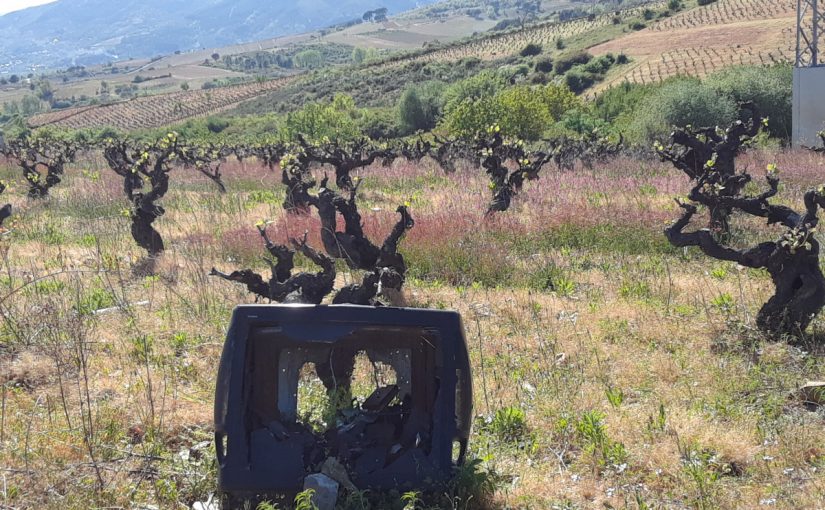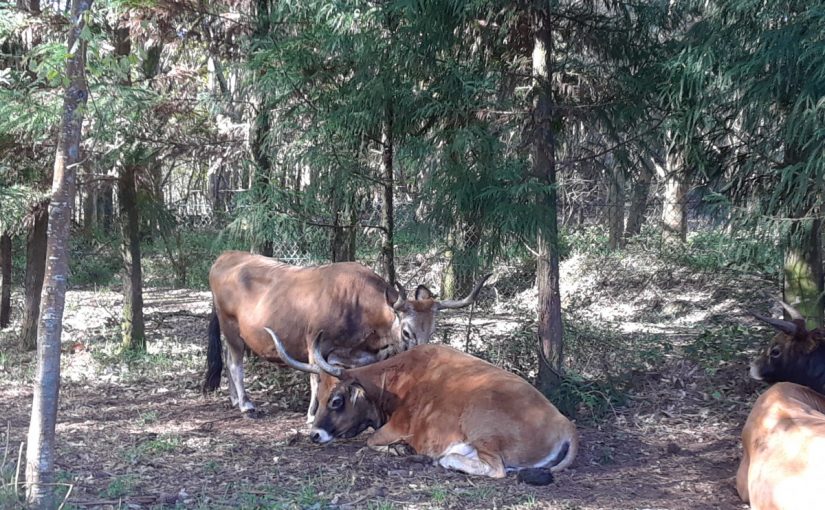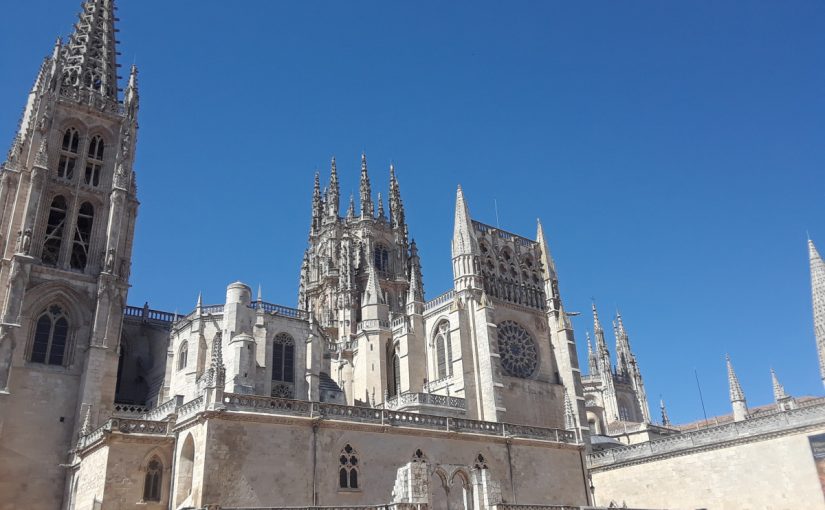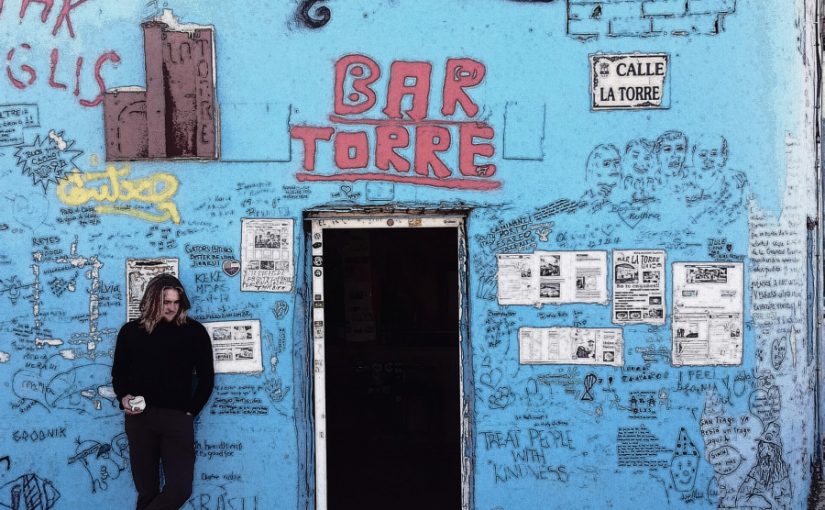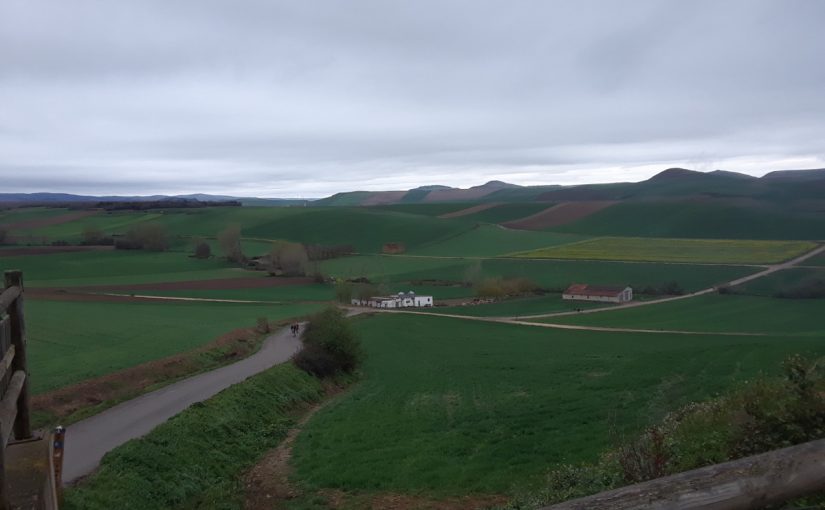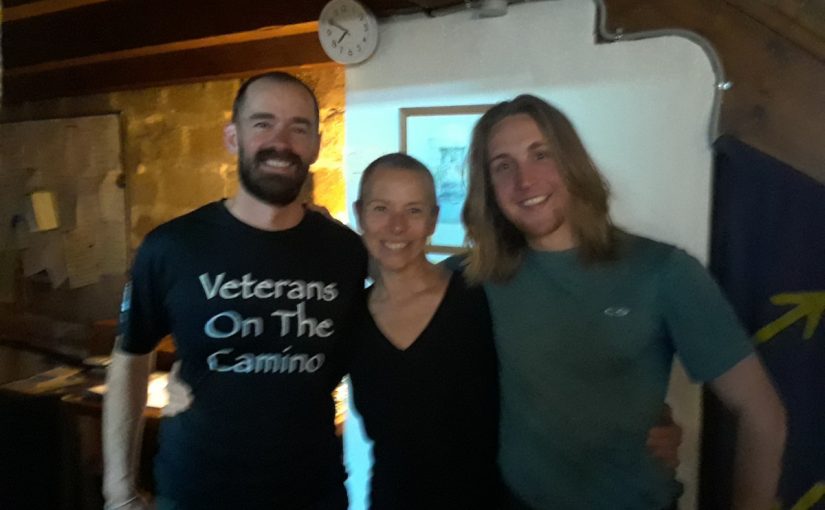The meseta rolls out of Burgos and into North Central Spain like the flattened farmland in the midwest of the USA. The towns decline from artful villages into ghostowns; barns on the outskirts with collapsed roofs left abandoned and lean cats that prowl in front of boarded up houses and unofficial dump sites.
I walk along the highway on white gravel tracks under a cloudless sky and the midday sun blares. Most of the time, when you see someone walking on the shoulder of a highway you can be certain that their plans went south and that they are having a really bad day.
Reliegos is a ghostown. Most of the buildings are abandoned. There are cats everywhere. Spencer and I walked into town at the hottest part of the day and checked into a hostel and went out for coffee.
The outside Bar Elvis is smattered in electric blue paint that splatters onto the sidewalk Jackson-Pollock-style. There is not a square foot of wall that is not crumbling or covered in reckless sharpie or spray paint and the two upper windows are boarded up and painted over with giant blue-green eyes.
John woke up the bartender, Simín, at five in the afternoon from a nap. Siesta in these towns is pretty loose. The Doors and David Bowie blast out of the open door and the bartender whistles to his own tune between his four remaining teeth. His dog–a mean pitbull with huge balls–paces the side yard that is full of crates of beer that bake in the sun and that leads to the bathroom with the dangling doorknob and stained floors. He stopped Spencer before he went out and caged the dog.
The fruit stand inside has four apples, two brown bananas and some lemons. Rent here must be fifty bucks a month or less. Or maybe he just squats here. The bartender turns on old time jazz with horns but he still whistles the same off pitch tune. I drink a cafe con leche at one of the tables out front that sprawl into the street, next to a retired umbrella with tape and an extension cord wrapped around the shaft that stands in a pile of ruptured sand bags and cigarette butts. This jazzy blue oasis is a real stand out in the quiet brown town.
I came back after dinner with Benjamin and Spencer. A small smattering of locals post at the bar and sip beer. Two TVs play silently in opposite corners, one shows a bootleg version of The Way on repeat and the picture glitches so that part of it is cut out and another doubled. The other plays Big Bang Theory silently and without subtitles. The inside of the walls are even more vandalized than the outside. A pig leg is buckled onto a cutting board on the top of the bar but all the edible portions look haphazardly hacked away.
Simín is dangerously muscular. Veins and triceps look less like natural occurrences and more like grotesque scars. His toothless mouth disappears in his beard and so the cigarette dangling from his mouth looks like appendage of his neck. He shuffles a through stack of CDs that people have given him throughout the years, never allowing one song to play all the way through and constantly howling, clapping and whistling off rhythm and out of tune. It is nine o’clock and he is sipping a beer and pours himself the first of many shots of vodka.
By ten he has put a respectable dent in the bottle of Schmirnoff and left a bottle of brandy on the bar for Luca to pour for himself. He whips out a match box of weed and throws nugs on the bartop and unrolls a ribbon of rolling paper all while holding eye contact with Benjamin. He throws another bottle of Vino Tinto with a drawing of himself on the label into the air and snags it one handed and pulls a carving knife out from underneath the pig leg in one motion. He holds the bottle out like a violin and flicks the foil cap off with the knife and jousts the knife back under the leg like a fencer with all the drunken confidence that Burroughs must have had as he balanced the glass on his wife’s head.
Credence Clear Water comes on and Simin leans back like he is in a limbo competition and pantomime-rope-climbs back to standing, grabs his foot and plays his leg like a guitar. He grabs the mangled pig leg and hacks off a dozen slices with the same knife he used to open the wine and then attacks a wheel of cheese with the same knife and puts it all on a platter in front of us and leaves the knife out for us to use. Nobody ordered any of it. He takes another shot of vodka and scurries around behind the bar to find a pair of scissors. He breaks them in half and throws both across the bar and they stick into a wood cabinet. Benjamin, Luca, an Argentinian man, and I are the only people in the bar and we all laugh in nervous, drunken disbelief. Simin is clearly encouraged so he lights another cigarette and runs through a door behind the bar that leads into the rest of the house. He leaves the door open and we all admire the squalor of his nest. The walls in the hallway are dark red and the only room that we can see is littered with large jars of anonymous liquids, boxes and loose insulation. Outside all two dozen residents of Reliegos are asleep.
Simín comes back with an antique double-barrel, sawed off shotgun that is made entirely of rusting iron. My spanish is terrible and Simín is slurring his words so I am clueless as to his intentions; I look over to Benjamin and Luca try to gauge whether it is time to leave. Simín slides a slug into each barrel and swings the gun around with the break action open. My three companions laugh again and don’t make a move–probably a similar reaction that Joan Burroughs had. I don’t smoke weed and have been cautious with the wine and now it becomes clear that I am the most sober person in the room. I slink behind a pillar and sneak a glance at the door to the establishment. The Argentinean man says something to him in spanish and Simín laughs from his belly and unloads the gun.
He charges us twenty five euros for four bottles of wine, ham, cheese, however much brandy Luca poured for himself and whatever nugs of weed my companions smoked. We all hug Simín and then walk out the glass door and back into reality.
